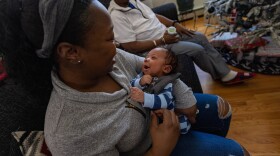-
As many as 40% more Black male patients in the study might have been diagnosed with breathing problems if current diagnosis-assisting computer software was changed, the study said.
-
Despite medical advances, disparities are expected to worsen in the coming decades. The expansion of the aging population and rising numbers of people with conditions that put them at risk are expected to contribute to this alarming scenario.
-
The University of Florida health system is exploring ways to better engage Black adults in need of health care.
-
Infant mortality rates across the South are by far the worst in the U.S. A look at South Carolina — where multimillion-dollar programs aimed at improving rates over the past 10 years have failed to move the needle — drives home the challenge of finding solutions.
-
An EEG can help diagnose conditions like epilepsy, sleep disorders and brain tumors. But a design flaw and outdated Eurocentric practices make the test less effective on thicker, denser and curly hair types.
-
Black women are nearly three times more likely than white women to die of pregnancy-related causes in the U.S. Two Miami doctors discuss the causes of this disparity and how to address them.
-
A Boston hospital gets daily, home blood pressure checks for moms at risk for the pregnancy complication, pre-eclampsia. The effort is a response to alarming rates of Black maternal mortality.
-
Many Black patients also try to be informed and minimize questions to put providers at ease. “The system looks at us differently,” says the founder of the African American Wellness Project.
-
Dr. Gail Dudley, a retired osteopathic doctor in Hillsborough County: "We have a history of discrimination, which we can change, but not if we sugarcoat it and cover it up."
-
Washington state regulators found formaldehyde, lead and arsenic in lipstick, powder foundations, skin lotions, and hair products marketed to and popular with women of color. Legislators there several other states are seeking to ban the products.
Play Live Radio
Next Up:
0:00
0:00
Available On Air Stations










